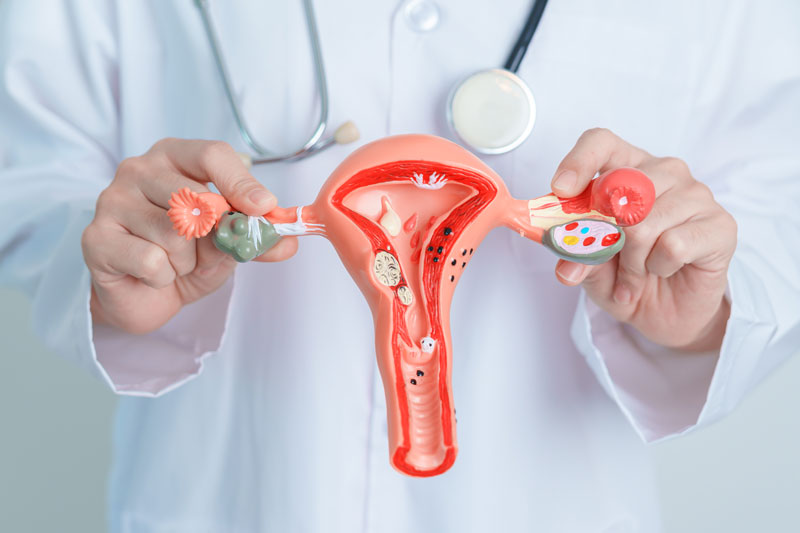What is Polycystic Ovary Syndrome?
Polycystic ovary syndrome (PCOS) is a common hormonal disorder in women of reproductive age. It is characterized by a combination of symptoms that can include:
- Irregular periods: Women with PCOS may have infrequent periods, or their periods may be heavy, prolonged, or unpredictable.
- Elevated levels of androgens: Women with PCOS may have higher-than-normal levels of male hormones such as testosterone, which can lead to symptoms such as acne, excess hair growth (hirsutism), and hair loss.
- “Cystic” appearance of the ovaries on ultrasound: Women with PCOS may have the appearance of cysts on their ovaries, which are actually follicles.
- Insulin resistance: Insulin resistance is a condition in which the body’s cells become less responsive to insulin, leading to elevated levels of insulin in the blood. This can contribute to weight gain, difficulty losing weight, and an increased risk of type 2 diabetes.

What Causes Polycystic Ovary Syndrome?
The exact cause of polycystic ovary syndrome (PCOS) is not fully understood, but it is believed to be related to a combination of genetic and environmental factors. Some factors that may contribute to the development of PCOS include:
- Insulin resistance: A condition in which the body’s cells become less responsive to insulin, leading to elevated levels of insulin in the blood. Insulin resistance can cause the ovaries to produce more androgens (male hormones), which can interfere with normal ovulation.
- Hormonal imbalances: Women with PCOS may have an imbalance of hormones such as luteinizing hormone (LH) and follicle-stimulating hormone (FSH), which can interfere with normal ovulation.
- Genetic factors: PCOS appears to run in families, suggesting that there may be a genetic component to the condition. However, the specific genes that are involved are not yet fully understood.
- Environmental factors: Some research suggests that exposure to certain environmental factors, such as endocrine-disrupting chemicals, may contribute to the development of PCOS.
It’s important to note that while the exact cause of PCOS is not fully understood, lifestyle factors such as diet, exercise, and stress may also play a role.
Symptoms of Polycystic Ovary Syndrome
The symptoms of polycystic ovary syndrome (PCOS) can vary from person to person, and not all women with PCOS will experience every symptom. Some common symptoms include:
- Irregular periods: Women with PCOS may have infrequent periods, or their periods may be heavy, prolonged, or unpredictable.
- Elevated levels of androgens: Women with PCOS may have higher-than-normal levels of male hormones such as testosterone, which can lead to symptoms such as acne, excess hair growth (hirsutism), and hair loss.
- “Cystic” appearance of the ovaries on ultrasound: Women with PCOS may have the appearance of cysts on their ovaries, which are actually follicles.
- Insulin resistance: Insulin resistance is a condition in which the body’s cells become less responsive to insulin, leading to elevated levels of insulin in the blood. This can contribute to weight gain, difficulty losing weight, and an increased risk of type 2 diabetes.
Other symptoms that may be associated with PCOS include:
- Weight gain or difficulty losing weight
- Fatigue
- Mood changes, such as depression or anxiety
- Sleep apnea
- Headaches
- Infertility or difficulty getting pregnant
It’s important to note that not all women with PCOS will experience every symptom, and some women may have mild or no symptoms at all. If you are experiencing any of these symptoms, it’s important to talk to your physician to determine if PCOS may be the underlying cause.

Treatment Options for Polycystic Ovary Syndrome
Treatment for polycystic ovary syndrome (PCOS) helps manage the symptoms and reduces the long-term health risks associated with the condition. Treatment options may include:
- Lifestyle changes: Making healthy lifestyle changes, such as maintaining a healthy diet, getting regular exercise, and managing stress, can help to reduce symptoms and improve overall health.
- Medications: Certain medications may be used to manage specific symptoms of PCOS:
– Estrogen/progesterone (in the form of birth control pills) to regulate periods
– Anti-androgens to decrease the effect of elevated testosterone (male hormone)
– Medications to manage insulin resistance and lower the risk of type 2 diabetes - Fertility treatments: Women who are struggling to conceive may benefit from a fertility evaluation and potential treatments such as ovulation induction or in vitro fertilization (IVF).
It’s important to work with a physician who specializes in PCOS to develop a treatment plan that is tailored to your individual needs and goals. In addition to medical treatments, lifestyle changes such as maintaining a healthy diet, getting regular exercise, and managing stress can also be helpful in managing symptoms and reducing long-term health risks associated with PCOS.
Frequently Asked Questions about Polycystic Ovary Syndrome
Is PCOS common?
PCOS affects 7–10% of women of childbearing age and is the most common cause of infertility. In the United States, an estimated 5 to 6 million women have PCOS. PCOS is the most common hormonal disorder among women of reproductive age, but many women don’t know they have it.
What is insulin resistance?
Insulin is a hormone produced by the pancreas that helps to regulate blood sugar levels by allowing glucose (sugar) to enter cells to be used as energy.
With insulin resistance, the cells in the body become less responsive to insulin, which causes glucose to build up in the bloodstream instead of being absorbed by the cells.
Can I become pregnant if I have PCOS?
Yes. Infertility isn’t experienced by all women. Some women may need help from a fertility specialist.





